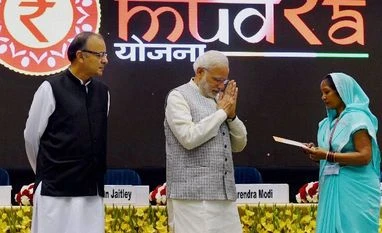Modi said these businesses would provide almost 10 times jobs to what was being generated by big companies.
MUDRA will have an initial corpus of Rs 20,000 crore and a credit guarantee corpus of Rs 3,000 crore. The initial corpus would be provided by banks from their priority sector lending shortfall.
To be an Non-banking financial company (NBFC) and a part of Sidbi, MUDRA will later take the form of a bank through a Bill, which the government will present in Parliament within the next one year, according to financial services secretary Hasmukh Adhia. With this, the long-awaited Bill on MFIs would not come and some of its provisions would be incorporated in the Bill on MUDRA, Adhia added. "It will also put in place entire mechanism as to how much interest rate can be charged for micro sector," he said. The issue had become quite contentious after the MFI sector had faced tough time, particularly in Andhra Pradesh when the state government tightened the noose on MFIs for recovery of loans in the wake of over- indebtedness of the loanees.
On whether MUDRA would regulate the NBFC (MFI), Adhia said, "That decision would be taken when the Bill will be framed.” He added the government was yet to take a call on whether MUDRA would be transformed into a universal bank.
“The government can decide to make it a policy bank like NHB (National Housing Bank) or it can decide to make it a universal bank,” he said.
Speaking about the broad contours of the proposed Bill, he said: “It will define what is going to be MFI. What is our definition of MFI. It will try and put in some process of registering new MFIs with MUDRA Bank."
It will also define functioning and objective of MUDRA Bank, Adhia said.
During the launch, the Prime Minister said the MUDRA scheme was aimed at “funding the unfunded”. He said India’s small entrepreneurs were used to exploitation at the hands of money lenders so far, but MUDRA would instill new confidence in them.
Small businesses can avail loan up to Rs 50,000; businesses that are a little bigger could avail loan of up to Rs 5 lakh; the highest bracket of loans available to the MSME sector would be up to Rs 10 lakh.
For further financing, the MSME sector affiliated entrepreneurs would be given a ‘MUDRA card’, which could provide further credit of up to Rs 20,000.
MUDRA would also partner with state, regional level co-ordinators to provide finance to the last-mile financiers of small and micro business enterprises.
The idea of MUDRA Bank was first envisaged in Budget 2015-16.
| FUNDING PUSH Primary product of MUDRA will be refinance for lending to micro businesses and units. The initial products are: |
|
“People think it’s big industries and corporate houses that provide higher employment. The truth is, only 12.5 million people are employed by big corporate houses, against 120 million by the MSME sector. We need to understand the energy of the bottom of the pyramid of individuals and provide them with means for upliftment. We want to study and adopt best practices on micro financing,” said Modi.
According to him, there’s a need to focus on these 57.5 million self-employed people who use funds of Rs 11 lakh crore, with an average per unit debt of merely Rs 17,000, he said.
“Write down my words. In one year, bankers will queue up in front of MUDRA and ask it to give five million clients,” said Modi.
The Confederation of Indian Industry’s new president Sumit Mazumder said MUDRA Bank would spur growth of the MSME Sector and help them increase their contribution to the country's gross domestic product from its current level of 38 per cent.
According to the 2013 survey by the National Sample Survey Organisation, there are 57.7 million small business units, mostly individual proprietorship, which run manufacturing, trading or services activities. These include small manufacturing units, shopkeepers, fruits, vegetable vendors, truck and taxi operators, food-service units, repair shops, machine operators, small industries, artisans, food processors, street vendors, among others.
Most of these ‘own-account enterprises’ are owned by people belonging to scheduled caste, scheduled tribe or other backward classes. The biggest bottleneck in the growth of entrepreneurship in this sector is the lack of financial support.
You’ve reached your limit of 10 free articles this month.
Subscribe now for unlimited access.
Already subscribed? Log in
Subscribe to read the full story →

Smart Quarterly
₹900
3 Months
₹300/Month
Smart Essential
₹2,700
1 Year
₹225/Month
Super Saver
₹3,900
2 Years
₹162/Month
Renews automatically, cancel anytime
Here’s what’s included in our digital subscription plans
Exclusive premium stories online
Over 30 premium stories daily, handpicked by our editors


Complimentary Access to The New York Times
News, Games, Cooking, Audio, Wirecutter & The Athletic
Business Standard Epaper
Digital replica of our daily newspaper — with options to read, save, and share


Curated Newsletters
Insights on markets, finance, politics, tech, and more delivered to your inbox
Market Analysis & Investment Insights
In-depth market analysis & insights with access to The Smart Investor


Archives
Repository of articles and publications dating back to 1997
Ad-free Reading
Uninterrupted reading experience with no advertisements


Seamless Access Across All Devices
Access Business Standard across devices — mobile, tablet, or PC, via web or app



)


